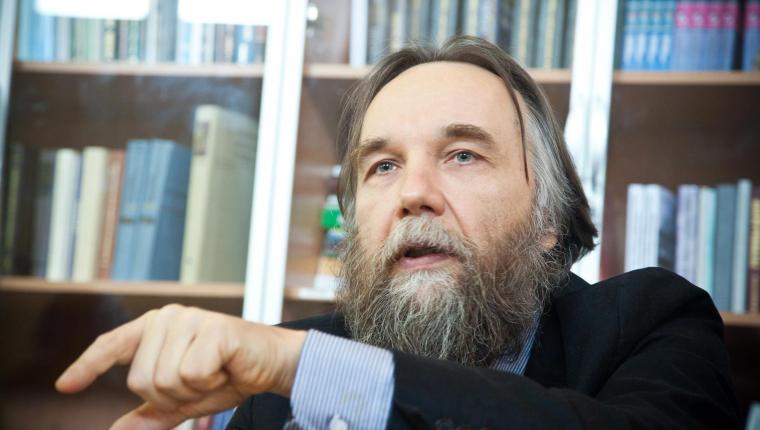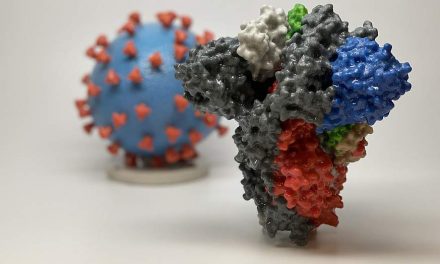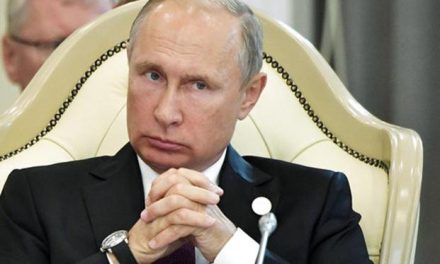After the Russians pulled out of Chernihiv, reporters raced into the city and surrounding suburbs to document the atrocities, and it makes for some hard reading. The brutality is breathtaking, and it wasn’t limited to human victims.
On a cattle farm on the edge of the village that Russian troops took over from Ukrainians who had been using it as a defensive position, Titan’s men executed dozens of cows and calves, shooting them in their throats and eyes at point-blank range and even beheading some, leaving the heads in a pile. Residents described the killings as violence for its own sake.
The carcasses of the cattle had been rotting for a week before Olla Korobka entered their holding pen on Monday with Iryna Horbonos and her son, Nikita, 25. They rescued the only survivor, one barely alive calf stuck under the rubble.
Svitlana Osypenko, her husband and 17 year-old son Ruslan barely survived a cluster munitions attack on their backyard. They’ve been in the hospital since March 15.
They covered their son, Ruslan, 17, with their own bodies. He escaped without injury, but the parents were both badly wounded.
Ruslan had to apply a tourniquet to his father’s leg as they waited for a ride to the hospital. One of their friends lay dead beside them.
“I think it was intentional that they hit civilian targets,” Valentyn said, showing the wounds to his right leg that remained covered in bloody bandages weeks later. “Our house is destroyed, our car is burned down.”
Svitlana, whose foot was broken, hobbled into Valentyn’s room on crutches and sat beside Ruslan on the next bed.
“We don’t know what we did to deserve this,” she said.
On March 17, the Russians bombed the hospital, but the Osypenkos survived that attack, too.
Svitlana wants to know what her family did to deserve this, and the answer is nothing. Yet, there is a rationale for it. On her Medium page, Mariia Kravchenko has posted a translated article (original here) from the Russian state-owned news agency RIA Novosti. Authored by Timofey Sergeytsev and entitled “What should Russia do with Ukraine?,” the article explains Vladimir Putin’s worldview.
Some form of the word “Nazi” is used dozens of times in the essay, beginning in the opening paragraphs.
We wrote about the inevitability of Ukraine’s denazification as early as last April. We do not need a Nazi, Banderite Ukraine, the enemy of Russia and a tool of the West used to destroy Russia. Today, the denazification issue has taken a practical turn.
Denazification is necessary when a considerable number of population (very likely most of it) has been subjected to the Nazi regime and engaged into its agenda. That is, when the “good people — bad government” hypothesis does not apply. Recognizing this fact forms the backbone of the denazification policy and all its measures…
As I was reading through this deranged screed, I kept waiting for some evidence that Ukraine is governed by Nazis or that its population has been thoroughly indoctrinated into something resembling National Socialism. Above all, I wanted to get a sense of how the Russians are defining Naziism. What do they mean by it?
But Mr. Sergeytsev wasn’t very forthcoming. Eventually, he appeared to concede my concern with his reasoning. In doing so, however, he gave me the definition I sought.
The current nazified Ukraine is characterized by its formlessness and ambivalence, which allow it to disguise Nazism as the aspiration to “independence” and the “European” (Western, pro-American) path of “development” (in reality, to degradation) and claim that “there is no Nazism” in Ukraine, “only few sporadic incidents.” Indeed, there isn’t a main Nazi party, no Führer, no full-fledged racial laws (only a cutdown version in the form of repressions against the Russian language). As a result — no opposition or resistance against the regime.
In other words, there’s nothing that Westerners would identify with Hitler or his regime. There’s no dictator, no party, no racial ideology, no death camps. There’s no imperial ambitions or intention of subjugating neighbors. Whatever anti-Semitism exists In Ukraine didn’t prevent its people from electing a Jew as their president. The Naziism is disguised, and it amounts to no more than a desire to join Europe and perhaps too strong a preference for the Ukrainian language over the Russian. Their biggest sin is not wanting to be dominated by Russia.
In this worldview, Ukraine is not a rightful country. It is an unfortunate legacy of the Bolsheviks’ decision to set up a union of socialist republics rather than just treating the whole USSR as part of a Russian whole. Never mind that the Ukrainian Socialist Republic never enjoyed any real autonomy or peace from Russian aggression and cruelty, they never should have been provided even the veneer or autonomy.
Denazification will inevitably include de-ukrainization — the rejection of the large-scale artificial inflation of the ethnic component in the self-identification of the population of the historical Malorossiya and Novorossiya territories, which was started by the Soviet authorities. Being a tool of the Communist superpower, this artificial ethnocentrism was not left unclaimed after its fall. It was transferred in its subservient role to a different superpower (the power above states) — the superpower of the West. It needs to be brought back within its natural boundaries and stripped of political functionality.
This echoes ideas promulgated by Alexander Dugin, who is often called “Putin’s philosopher,” although that title is also ascribed to Ivan Ilyan as well.
On the eve of his murderous invasion, Russian President Vladimir Putin delivered a long and rambling discourse denying the existence of Ukraine and Ukrainians, a speech many Western analysts found strange and untethered. Strange, yes. Untethered, no. The analysis came directly from the works of a fascist prophet of maximal Russian empire named Aleksandr Dugin.
Here’s the most important thing to know about Dugin.
In his magnum opus, “The Foundations of Geopolitics: The Geopolitical Future of Russia,” published in 1997, Dugin mapped out the game plan in detail. Russian agents should foment racial, religious and sectional divisions within the United States while promoting the United States’ isolationist factions. (Sound familiar?) In Great Britain, the psy-ops effort should focus on exacerbating historic rifts with Continental Europe and separatist movements in Scotland, Wales and Ireland. Western Europe, meanwhile, should be drawn in Russia’s direction by the lure of natural resources: oil, gas and food. NATO would collapse from within.
As for Ukraine, it cannot be allowed to exist.
With the undermining of the West going so well, Putin has turned to the pages of Dugin’s text in which he declared: “Ukraine as an independent state with certain territorial ambitions represents an enormous danger for all of Eurasia,” and “without resolving the Ukrainian problem, it is in general senseless to speak about continental politics.”
So what comes next, should Putin manage to “resolve” Russia’s “problem” in Ukraine? Dugin envisions a gradual dividing of Europe into zones of German and Russian influence, with Russia very much in charge thanks to its eventual stranglehold over Germany’s resource needs. As Great Britain crumbles and Russia picks up the pieces, the empire of Eurasia will ultimately stretch, in Dugin’s words, “from Dublin to Vladisvostok.”
Let’s listen to what Dugin had to say about the war during a March 21 interview on Al-Jazeera.
As he states, Russia has put everything on the line in Ukraine and it must be allowed to win or they will destroy all life on the planet. Dugin argues that the war in Ukraine is a war against a liberal world order and that if Russia does not prevail then humanity cannot continue to exist.
So, if we ask what the Ukrainians did to deserve their fate, maybe we are taking too narrow of a view. Putin, in following Dugin’s program, may be willing to blow up the world rather than face defeat. Whether he can get his subordinates to follow that order is another question, but it’s clear that this is the most dangerous imaginable situation.
But nuclear blackmail isn’t a magic wand for Russia. The world isn’t going to submit.






